各种传统节日的中英文介绍
中国传统节日及传说中英文对照
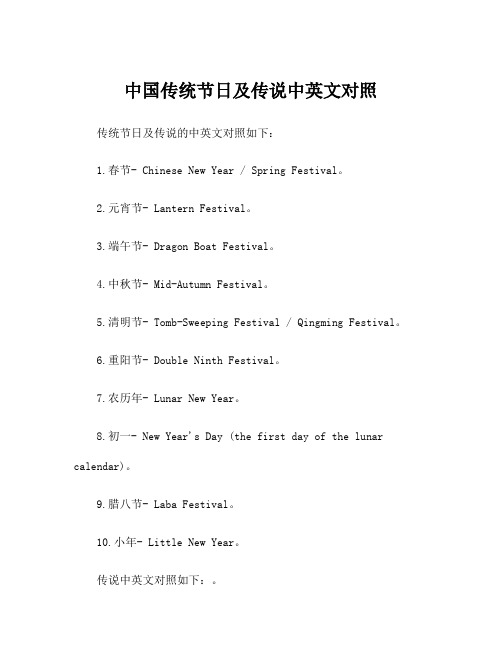
中国传统节日及传说中英文对照传统节日及传说的中英文对照如下:1.春节- Chinese New Year / Spring Festival。
2.元宵节- Lantern Festival。
3.端午节- Dragon Boat Festival。
4.中秋节- Mid-Autumn Festival。
5.清明节- Tomb-Sweeping Festival / Qingming Festival。
6.重阳节- Double Ninth Festival。
7.农历年- Lunar New Year。
8.初一- New Year's Day (the first day of the lunar calendar)。
9.腊八节- Laba Festival。
10.小年- Little New Year。
传说中英文对照如下:。
1.嫦娥奔月- Chang'e Flying to the Moon。
2.神话五岳- The Myth of the Five Sacred Mountains。
3.龙舟竞渡- The Legend of Dragon Boat Racing。
4.桃花源- The Peach Blossom Spring。
5.白蛇传- The Legend of White Snake。
6.八仙过海- The Eight Immortals Cross the Sea。
7.牛郎织女- The Cowherd and the Weaver Girl。
8.茶的传说- The Legend of Tea。
9.粽子的传说- The Legend of Zongzi。
10.红烧肉的传说- The Legend of Braised Pork Belly。
中国传统节日(中英文对照)
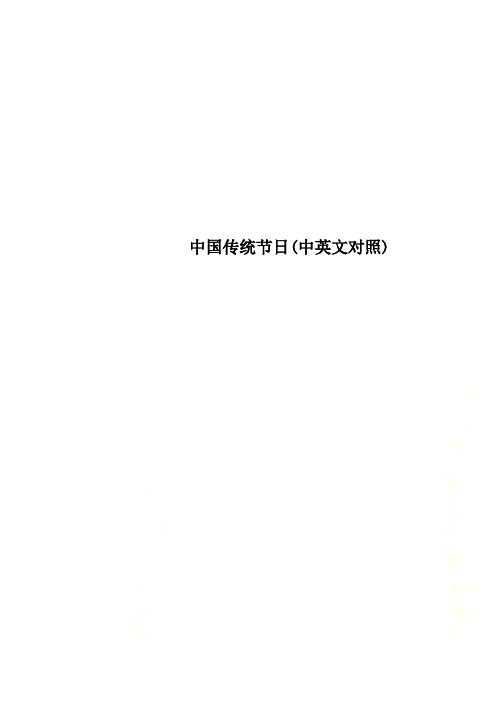
中国传统节日(中英文对照)中国传统节日(中英文对照简介)目录The Spring Festival(春节)Lantern Festival(元宵节)Qingming Festival(清明节)Dragon Boat Festival(端午节)Double Seventh Festival(七夕)Mid-Autumn Festival(中秋节)Double Ninth Festival(重阳节)Winter Solstice Festival(冬至)together to have dinner while watching TV programs.For Chinese at home and abroad, the Spring Festival is always the most important festival.农历的正(zheng)月初一,是中国的农历新年。
在中国的传统节日中,这是一个最重要、最热闹的节日。
因为过农历新年的时候,正是冬末春初,所以人们也把这个节日叫“春节”。
中国人过春节有很多传统习俗。
从腊月二十三起,人们就开始准备过年了。
在这段时间里,家家户户要大扫除,买年货,贴窗花,挂年画,写春联,蒸年糕,做好各种食品,准备辞旧迎新。
春节的前夜叫“除夕”。
除夕之夜,是家人团聚的时候。
一家人围坐在一起,吃一顿丰盛的年夜饭,说说笑笑,直到天亮,这叫守岁。
除夕零点的钟声一响,人们还要吃饺子。
古时候叫零点为“子时”,除夕的子时正是新旧年交替的时候,人们在这时吃饺子,是取“更岁交子”的意思。
这也是“饺子”名称的由来。
过了除夕就是大年初一。
从初一开始,人们要走亲戚、看朋友,互相拜年。
拜年,是春节的重要习俗。
拜年时,大家都要说一些祝愿幸福、健康的吉祥话。
放爆竹是春节期间孩子们最喜欢的活动。
传说燃放爆竹可以驱妖除魔,所以每年从除夕之夜起,到处就响起了接连不断的爆竹声。
阵阵烟花,声声爆竹,给节日增添了喜庆的气氛。
中国传统节日英语知识
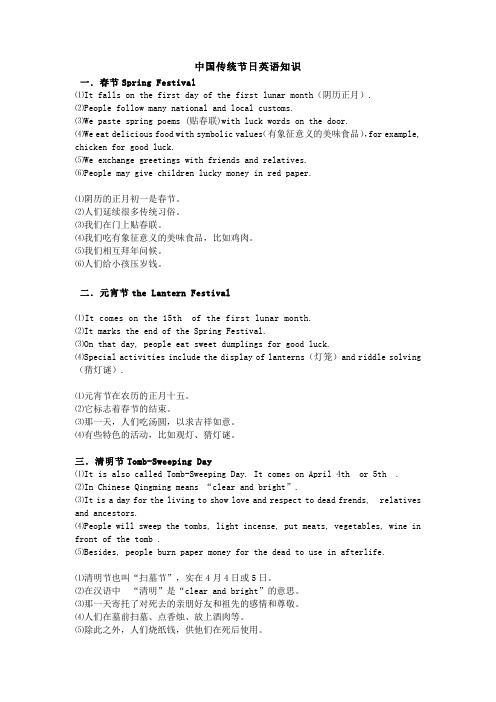
中国传统节日英语知识一.春节Spring Festival⑴It falls on the first day of the first lunar month(阴历正月).⑵People follow many national and local customs.⑶We paste spring poems (贴春联)with luck words on the door.⑷We eat delicious food with symbolic values(有象征意义的美味食品),for example, chicken for good luck.⑸We exchange greetings with friends and relatives.⑹People may give children lucky money in red paper.⑴阴历的正月初一是春节。
⑵人们延续很多传统习俗。
⑶我们在门上贴春联。
⑷我们吃有象征意义的美味食品,比如鸡肉。
⑸我们相互拜年问候。
⑹人们给小孩压岁钱。
二.元宵节the Lantern Festival⑴It comes on the 15th of the first lunar month.⑵It marks the end of the Spring Festival.⑶On that day, people eat sweet dumplings for good luck.⑷Special activities include the display of lanterns(灯笼)and riddle solving (猜灯谜).⑴元宵节在农历的正月十五。
⑵它标志着春节的结束。
⑶那一天,人们吃汤圆,以求吉祥如意。
⑷有些特色的活动,比如观灯、猜灯谜。
三.清明节Tomb-Sweeping Day⑴It is also called Tomb-Sweeping Day. It comes on April 4th or 5th .⑵In Chinese Qingming means “clear and bright”.⑶It is a day for the living to show love and respect to dead frends, relatives and ancestors.⑷People will sweep the tombs, light incense, put meats, vegetables, wine in front of the tomb .⑸Besides, people burn paper money for the dead to use in afterlife.⑴清明节也叫“扫墓节”,实在4月4日或5日。
中国传统节日(中英文对照)
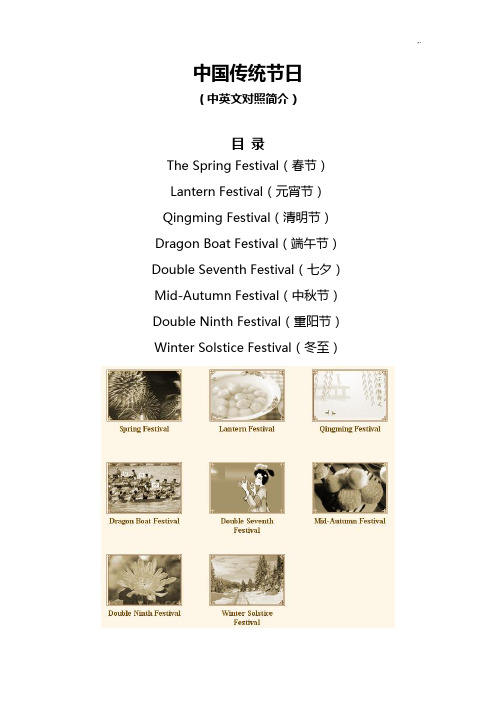
中国传统节日(中英文对照简介)目录The Spring Festival(春节)Lantern Festival(元宵节)Qingming Festival(清明节)Dragon Boat Festival(端午节)Double Seventh Festival(七夕)Mid-Autumn Festival(中秋节)Double Ninth Festival(重阳节)Winter Solstice Festival(冬至)The Spring Festival(春节)The first day of the first lunar month is the New Year in the Chinese lunar calendar. Among the traditional Chinese festivals, this is the most important and the most bustling. Since it occurs at the end of winter and the beginning of spring, people also call it the Spring Festival.Chinese have many traditional customs relating to the Spring Festival. Since the 23rd day of the 12th lunar montha, people start to prepare for the event. Every family will undertake thorough cleaning, do their Spring Festival shopping, create paper-cuts for window decoration, put up New Year picturesb, write Spring Festival coupletsc, make New Year cakesd, and also prepare all kinds of food to bid farewell to the old and usher in the new.New Year's Eve is the time for a happy reunion of all family members, when they sit around the table to have a sumptuous New Year's Eve dinner, talking and laughing, until daybreak, which is called "staying up to see the year out". When the bell tolls midnight on New Year's Eve, people eat dumplings. In ancient times, midnight was called zishi (a period of the day from 11 p.m. to 1 a.m.). Dumplings (jiaozi) are eaten because it sounds the same as "change of the year and the day" in Chinese.From the first day of the lunar year, people pay New Year calls on relatives and friends, which is an important custom for the Spring Festival.Setting off firecrackers is the favorite activity of children in the Spring Festival. According to legend, this could drive off evil spirits. The continuous sound of firecrackers can be heard everywhere, adding to the atmosphere of rejoicing and festivity.Many places hold temple fairs. The wonderful dragon lantern dance and the lion dance performances, along with various handicraft articles and local snacks attract thousands of people.With the development of the times, some changes have taken place inthe customs of spending the Spring Festival. For example, to prevent environmental pollution, many cities have banned firecrackers. But this does not have an impact on the happy atmosphere of the festival. On New Year's Eve, family members get together to have dinner while watching TV programs.For Chinese at home and abroad, the Spring Festival is always the most important festival.农历的正(zheng)月初一,是中国的农历新年。
中西方传统节日的英语总结

中西方传统节日的英语总结1.元旦(1月1日) New Year's Day2.春节(农历一月一日) Spring Festival;Chinese New Year's Day3.元宵节(农历一月十五日) Lantern Festival4.妇女节(3月8日) Women's Day5.清明节(4月5日) Tomb-Sweeping Day6.劳动节(5月1日) International Labor Day7.端午节(农历五月初五) Dragon Boat Festival8.儿童节(6月1日) International Children's Day9.七夕节(农历七月初七)Double Seventh Festival;Chinese Valentine's Day10.中秋节(农历八月十五) Mid-Autumn (Moon)Festival11.重阳节(农历九月九日) Double-ninth Day12.教师节(9月10日) Teachers' Day13.国庆节(10月1日) National Day14.除夕(农历十二月三十日)New Year's Eve1.新年(1月1日) New Year's Day2.情人节(2月14日) Valentine's Day3.愚人节(4月4日) April Fool′s Day4.复活节(春分月圆后的第一个星期日3月21至4月25之间) Easter Day5.母亲节(5月的第二个星期日) Mother's Day6.父亲节(6月的第三个星期日) Father's Day7.万圣节(11月1日) Halloween Day8.感恩节(11月的第四个星期四) Thanksgiving Day9.平安夜(12月24日) Christmas Eve10.圣诞节(12月25日) Christmas Day。
中国传统节日中英文对照
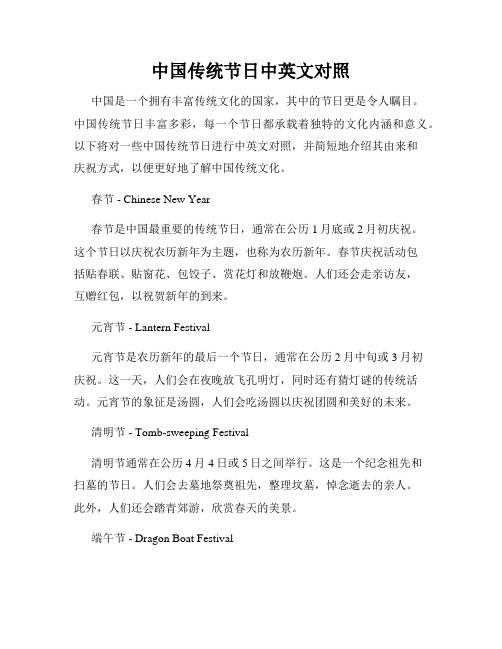
中国传统节日中英文对照中国是一个拥有丰富传统文化的国家,其中的节日更是令人瞩目。
中国传统节日丰富多彩,每一个节日都承载着独特的文化内涵和意义。
以下将对一些中国传统节日进行中英文对照,并简短地介绍其由来和庆祝方式,以便更好地了解中国传统文化。
春节 - Chinese New Year春节是中国最重要的传统节日,通常在公历1月底或2月初庆祝。
这个节日以庆祝农历新年为主题,也称为农历新年。
春节庆祝活动包括贴春联、贴窗花、包饺子、赏花灯和放鞭炮。
人们还会走亲访友,互赠红包,以祝贺新年的到来。
元宵节 - Lantern Festival元宵节是农历新年的最后一个节日,通常在公历2月中旬或3月初庆祝。
这一天,人们会在夜晚放飞孔明灯,同时还有猜灯谜的传统活动。
元宵节的象征是汤圆,人们会吃汤圆以庆祝团圆和美好的未来。
清明节 - Tomb-sweeping Festival清明节通常在公历4月4日或5日之间举行。
这是一个纪念祖先和扫墓的节日。
人们会去墓地祭奠祖先,整理坟墓,悼念逝去的亲人。
此外,人们还会踏青郊游,欣赏春天的美景。
端午节 - Dragon Boat Festival端午节是一个具有悠久历史的节日,通常在公历6月初庆祝。
这个节日源于纪念古代爱国诗人屈原,也是一项庆祝夏天到来的活动。
人们会参加龙舟赛、包粽子和挂艾草。
象征食物是粽子,人们吃粽子以保护自己免受邪恶和疾病的侵袭。
中秋节 - Mid-Autumn Festival中秋节是农历八月十五,通常在公历9月底或10月初庆祝。
这个节日庆祝秋天的丰收和团圆。
人们会赏月、品尝月饼以及举办家庭聚会。
月饼是中秋节的特色食物,馅料的种类多样,寓意着团圆和祝福。
重阳节 - Double Ninth Festival重阳节通常在公历9月初或10月底庆祝,也被称为老人节。
此节日的由来与古代传说有关,人们会爬山、采菊、追溯阳光,并祝福年长的亲人和朋友。
重阳节也是缅怀祖先和尊重老年人的时间。
中国传统节日(中英文对照)

中国传统节日(中英文对照简介)目录The Spring Festival(春节)Lantern Festival(元宵节)Qingming Festival(清明节)Dragon Boat Festival(端午节)Double Seventh Festival(七夕)Mid-Autumn Festival(中秋节)Double Ninth Festival(重阳节)Winter Solstice Festival(冬至)The Spring Festival(春节)The first day of the first lunar month is the New Year in the Chinese lunar calendar. Among the traditional Chinese festivals, this is the most important and the most bustling. Since it occurs at the end of winter and the beginning of spring, people also call it the Spring Festival.Chinese have many traditional customs relating to the Spring Festival. Since the 23rd day of the 12th lunar montha, people start to prepare for the event. Every family will undertake thorough cleaning, do their Spring Festival shopping, create paper-cuts for window decoration, put up New Year picturesb, write Spring Festival coupletsc, make New Year cakesd, and also prepare all kinds of food to bid farewell to the old and usher in the new.New Year's Eve is the time for a happy reunion of all family members, when they sit around the table to have a sumptuous New Year's Eve dinner, talking and laughing, until daybreak, which is called "staying up to see the year out". When the bell tolls midnight on New Year's Eve, people eat dumplings. In ancient times, midnight was called zishi (a period of the day from 11 p.m. to 1 a.m.). Dumplings (jiaozi) are eaten because it sounds the same as "change of the year and the day" in Chinese.From the first day of the lunar year, people pay New Year calls on relatives and friends, which is an important custom for the Spring Festival.Setting off firecrackers is the favorite activity of children in the Spring Festival. According to legend, this could drive off evil spirits. The continuous sound of firecrackers can be heard everywhere, adding to the atmosphere of rejoicing and festivity.Many places hold temple fairs. The wonderful dragon lantern dance and the lion dance performances, along with various handicraft articles and local snacks attract thousands of people.With the development of the times, some changes have taken place in the customs of spending the Spring Festival. For example, to prevent environmental pollution, many cities have banned firecrackers. But this does not have an impact on the happy atmosphere of the festival. On New Year's Eve, family members get together to have dinner while watching TV programs.For Chinese at home and abroad, the Spring Festival is always the most important festival.农历的正(zheng)月初一,是中国的农历新年。
中国传统节日(中英对照)
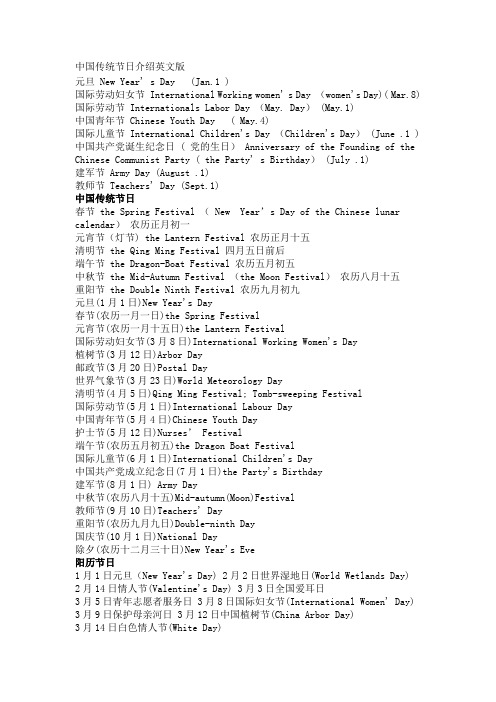
中国传统节日介绍英文版元旦 New Year' s Day (Jan.1 )国际劳动妇女节 International Working women' s Day (women's Day)( Mar.8) 国际劳动节 Internationals Labor Day (May. Day) (May.1)中国青年节 Chinese Youth Day ( May.4)国际儿童节 International Children's Day (Children's Day) (June .1 ) 中国共产党诞生纪念日 ( 党的生日) Anniversary of the Founding of the Chinese Communist Party ( the Party' s Birthday) (July .1)建军节 Army Day (August .1)教师节 Teachers' Day (Sept.1)中国传统节日春节 the Spring Festival ( New Year’s Day of the Chinese lunar calendar)农历正月初一元宵节(灯节) the Lantern Festival 农历正月十五清明节 the Qing Ming Festival 四月五日前后端午节 the Dragon-Boat Festival 农历五月初五中秋节 the Mid-Autumn Festival (the Moon Festival)农历八月十五重阳节 the Double Ninth Festival 农历九月初九元旦(1月1日)New Year's Day春节(农历一月一日)the Spring Festival元宵节(农历一月十五日)the Lantern Festival国际劳动妇女节(3月8日)International Working Women's Day植树节(3月12日)Arbor Day邮政节(3月20日)Postal Day世界气象节(3月23日)World Meteorology Day清明节(4月5日)Qing Ming Festival; Tomb-sweeping Festival国际劳动节(5月1日)International Labour Day中国青年节(5月4日)Chinese Youth Day护士节(5月12日)Nurses’ Festival端午节(农历五月初五)the Dragon Boat Festival国际儿童节(6月1日)International Children's Day中国共产党成立纪念日(7月1日)the Party's Birthday建军节(8月1日) Army Day中秋节(农历八月十五)Mid-autumn(Moon)Festival教师节(9月10日)Teachers' Day重阳节(农历九月九日)Double-ninth Day国庆节(10月1日)National Day除夕(农历十二月三十日)New Year's Eve阳历节日1月1日元旦(New Year's Day) 2月2日世界湿地日(World Wetlands Day)2月14日情人节(Valentine's Day) 3月3日全国爱耳日3月5日青年志愿者服务日 3月8日国际妇女节(International Women' Day) 3月9日保护母亲河日 3月12日中国植树节(China Arbor Day)3月14日白色情人节(White Day)3月14日国际警察日(International Policemen' Day)3月15日世界消费者权益日(World Consumer Right Day)3月21日世界森林日(World Forest Day)3月21日世界睡眠日(World Sleep Day)3月22日世界水日(World Water Day)3月23日世界气象日(World Meteorological Day)3月24日世界防治结核病日(World Tuberculosis Day)4月1日愚人节(April Fools' Day)4月5日清明节(Tomb-sweeping Day)4月7日世界卫生日(World Health Day)4月22日世界地球日(World Earth Day)4月26日世界知识产权日(World Intellectual Property Day)5月1日国际劳动节(International Labor Day)5月3日世界哮喘日(World Asthma Day)5月4日中国青年节(Chinese Youth Day)5月8日世界红十字日(World Red-Cross Day)5月12日国际护士节(International Nurse Day)5月15日国际家庭日(International Family Day)5月17日世界电信日(World Telecommunications Day)5月20日全国学生营养日5月23日国际牛奶日(International Milk Day)5月31日世界无烟日(World No-Smoking Day)6月1日国际儿童节(International Children's Day)6月5日世界环境日(International Environment Day)6月6日全国爱眼日6月17日世界防治荒漠化和干旱日(World Day to combat desertification) 6月23日国际奥林匹克日(International Olympic Day)6月25日全国土地日6月26日国际禁毒日(International Day Against Drug Abuse and Illicit Trafficking)7月1日中国共产党诞生日(Anniversary of the Founding of the Chinese Communist Party)7月1日国际建筑日(International Architecture Day)7月7日中国人民抗日战争纪念日7月11日世界人口日(World Population Day)8月1日中国人民解放军建军节(Army Day)8月12日国际青年节(International Youth Day)9月8日国际扫盲日(International Anti-illiteracy Day)9月10日中国教师节(Teacher's Day)9月16日中国脑健康日9月16日国际臭氧层保护日(International Day for the Preservation of the Ozone Layer)9月20日全国爱牙日9月21日世界停火日(World Cease-fire Day)9月27日世界旅游日(World Tourism Day)10月1日中华人民共和国国庆节(National Day)10月1日国际音乐日(International Music Day)10月1日国际老年人日(International Day of Older Persons)10月4日世界动物日(World Animal Day)10月5日世界教师日(World Teachers' Day)(联合国教科文组织确立)10月8日全国高血压日10月9日世界邮政日(World Post Day)10月10日世界精神卫生日(World Mental Health Day)10月14日世界标准日(World Standards Day)10月15日国际盲人节(International Day of the Blind)10月15日世界农村妇女日(World Rural Women's Day)10月16日世界粮食日(World Food Day)10月17日国际消除贫困日(International Day for the Eradication of Poverty)10月24日联合国日(United Nations Day)10月24日世界发展新闻日(World Development Information Day)10月28日中国男性健康日10月29日国际生物多样性日(International Biodiversity Day)10月31日万圣节(Halloween)11月8日中国记者节11月9日消防宣传日11月14日世界糖尿病日(World Diabetes Day)11月17日国际大学生节11月25日国际消除对妇女的暴力日(International Day For the elimination of Violence against Women)12月1日世界爱滋病日(World AIDS Day)12月3日世界残疾人日(World Disabled Day)12月4日全国法制宣传日12月9日世界足球日(World Football Day)12月25日圣诞节(Christmas Day)12月29日国际生物多样性日(International Biological Diversity Day)1月最后一个星期日国际麻风节3月最后一个完整周的星期一中小学生安全教育日春分月圆后的第一个星期日复活节(Easter Monday)(有可能是3月22-4月25日间的任一天)5月第二个星期日母亲节(Mother's Day)5月第三个星期日全国助残日6月第三个星期日父亲节(Father's Day)9月第三个星期二国际和平日(International Peace Day)9月第三个星期六全国国防教育日9月第四个星期日国际聋人节(International Day of the Deaf)10月的第一个星期一世界住房日(World Habitat Day)10月的第二个星斯一加拿大感恩节(Thanksgiving Day)10月第二个星期三国际减轻自然灾害日(International Day for Natural Disaster Reduction)10月第二个星期四世界爱眼日(World Sight Day)11月最后一个星期四美国感恩节(Thanksgiving Day)农历节日农历正月初一春节(the Spring Festival)农历正月十五元宵节(Lantern Festival)农历五月初五端午节(the Dragon-Boat Festival)农历七月初七乞巧节(中国情人节)(Double-Seventh Day)农历八月十五中秋节(the Mid-Autumn Festival)农历九月初九重阳节(the Double Ninth Festival)农历腊月初八腊八节(the laba Rice Porridge Festival)农历腊月二十四传统扫房日。
中西方传统节日英文介绍
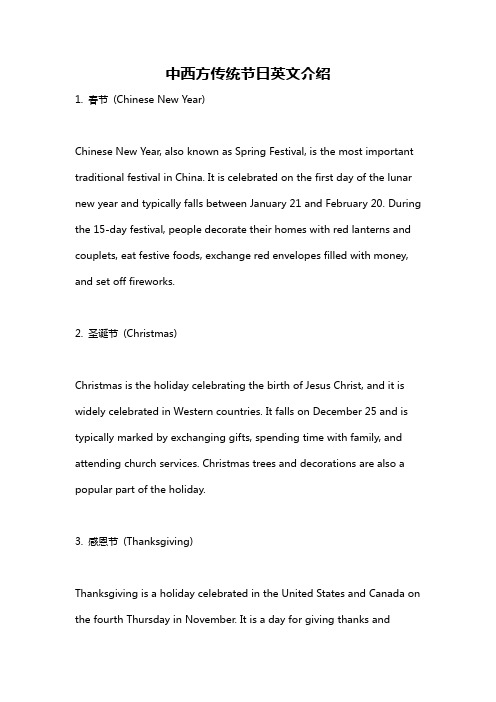
中西方传统节日英文介绍1. 春节(Chinese New Year)Chinese New Year, also known as Spring Festival, is the most important traditional festival in China. It is celebrated on the first day of the lunar new year and typically falls between January 21 and February 20. During the 15-day festival, people decorate their homes with red lanterns and couplets, eat festive foods, exchange red envelopes filled with money, and set off fireworks.2. 圣诞节(Christmas)Christmas is the holiday celebrating the birth of Jesus Christ, and it is widely celebrated in Western countries. It falls on December 25 and is typically marked by exchanging gifts, spending time with family, and attending church services. Christmas trees and decorations are also a popular part of the holiday.3. 感恩节(Thanksgiving)Thanksgiving is a holiday celebrated in the United States and Canada on the fourth Thursday in November. It is a day for giving thanks andcelebrating the blessings of the past year. Traditional food for the holiday includes turkey, stuffing, mashed potatoes, and pumpkin pie.4. 万圣节(Halloween)Halloween is a holiday celebrated on October 31, primarily in the US and Canada but also in other Western countries. It is a day for dressing up in costumes, decorating homes and neighborhoods with spooky decorations, and trick-or-treating for candy.5. 端午节(Dragon Boat Festival)The Dragon Boat Festival, also known as Duanwu Festival, is a traditional holiday in China that falls on the fifth day of the fifth lunar month, typically in June. The festival commemorates the death of Qu Yuan, a Chinese poet and politician who died over 2,000 years ago. On this day, people eat zongzi (sticky rice wrapped in bamboo leaves) and race dragon boats in memory of Qu Yuan.6. 复活节(Easter)Easter is a holiday celebrating the resurrection of Jesus Christ. It iscelebrated in Christian countries around the world and typically falls in March or April. The holiday is marked by attending church services, decorating eggs, and having Easter egg hunts. Easter bunnies and chocolate eggs are also popular symbols of the holiday.。
中国传统节日及英语

中国传统节日及英语以下是一些中国传统节日的名称及其对应的英语翻译:1.春节(Chūn Jié) - Spring Festival / Chinese New Year:春节是中国最重要的传统节日,也是农历新年的开始,通常在1月21日至2月20日之间。
2.元宵节(Yuán Xiāo Jié) - Lantern Festival:元宵节是春节的最后一天,通常在农历正月十五,庆祝活动包括赏花灯和吃汤圆。
3.清明节(Qīng Míng Jié) - Qingming Festival / Tomb-Sweeping Day:清明节通常在每年的4月4日至4月6日之间,是祭扫祖先墓地的日子。
4.端午节(Duān Wǔ Jié) - Dragon Boat Festival:端午节在农历五月初五,人们赛龙舟、吃粽子,以纪念屈原。
5.中秋节(Zhōng Qiū Jié) - Mid-Autumn Festival / MoonFestival:中秋节在农历八月十五,家人团聚,赏月,吃月饼。
6.重阳节(Chóng Yáng Jié) - Double Ninth Festival:重阳节在农历九月初九,人们爬山、赏菊花,以避灾祈福。
7.冬至(Dōng Zhì) - Winter Solstice Festival:冬至通常在12月21日或22日,人们会吃湖南省特色的汤圆。
8.腊八节(Là Bā Jié) - Laba Festival:腊八节在农历腊月初八,人们吃腊八粥,祈求健康平安。
以上是一些中国传统节日及其英语翻译,这些节日在中国有着悠久的历史和丰富的文化内涵。
传统节日英语讲解

1. 春节(Spring Festival)基本介绍:The Spring Festival, also known as Chinese New Year, is the most importanttraditional festival in China. It marks the turn of the lunar calendar and falls on the first day of the first lunar month, usually between late January and mid-February in the Gregorian calendar.庆祝活动:•Family Reunion Dinner (团圆饭): Families gather for a feast, symbolizing unity and prosperity.•Fireworks and Firecrackers (烟花爆竹): To scare away evil spirits and welcome the new year with a bang.•Red Envelopes (红包): Elders give red envelopes filled with money to children and unmarried adults, as a symbol of good luck and blessings.•Spring Couplets and Lanterns (春联和灯笼): Decorations that add festive atmosphere, with Spring Couplets expressing wishes for the new year.2. 中秋节(Mid-Autumn Festival)基本介绍:The Mid-Autumn Festival falls on the 15th day of the eighth lunar month, when the moon is at its fullest and brightest. It is a time for family reunion and appreciation of the harvest.庆祝活动:•Mooncakes (月饼): A round pastry filled with sweet or savory ingredients, symbolizing reunion and completeness.•Admiring the Moon (赏月): Families gather to appreciate the bright full moon, often accompanied by mooncakes and tea.•Lantern Festivals (灯会): Displaying colorful lanterns and participating in lantern riddles.3. 端午节(Dragon Boat Festival)基本介绍:The Dragon Boat Festival, celebrated on the fifth day of the fifth lunar month,commemorates the ancient Chinese poet Qu Yuan. It's also a time for dragon boat races and eating zongzi (rice dumplings).庆祝活动:•Dragon Boat Races (龙舟赛): Teams race long, narrow boats paddled by many oarsmen, often decorated with dragon heads and tails.•Eating Zongzi (吃粽子): Rice dumplings wrapped in bamboo leaves, filled with various ingredients like sweet red bean paste or savory meats.•Drinking Realgar Wine (饮雄黄酒): An old tradition believed to ward off evil spirits and diseases.4. 清明节(Qingming Festival)基本介绍:The Qingming Festival, also known as Tomb-Sweeping Day, falls on the 15th day after the Spring Equinox, usually around April 4 or 5 in the Gregorian calendar. It's a time for remembering ancestors and paying respects at their graves.庆祝活动:•Tomb Sweeping (扫墓): Visiting and cleaning the graves of ancestors, often accompanied by offerings of flowers, food, and paper money.•Spring Outings (踏青): Enjoying the blooming spring scenery, hiking, and picnicking in nature.•Flying Kites (放风筝): A popular activity believed to help bring good luck and dispel bad luck.。
英文版传统节日介绍.
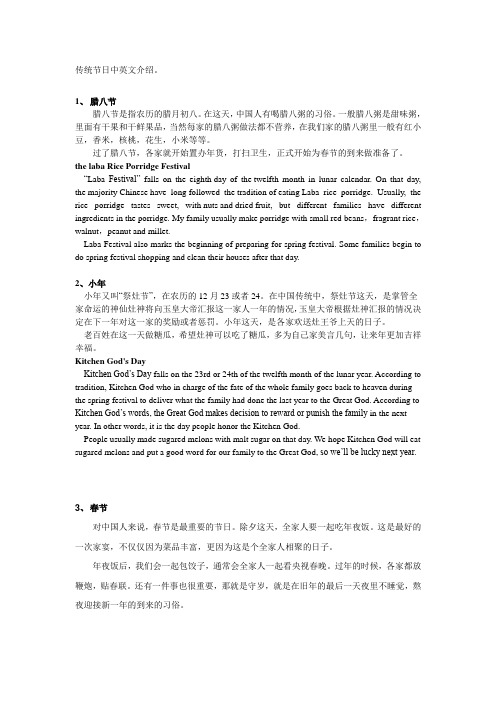
传统节日中英文介绍。
1、腊八节腊八节是指农历的腊月初八。
在这天,中国人有喝腊八粥的习俗。
一般腊八粥是甜味粥,里面有干果和干鲜果品,当然每家的腊八粥做法都不营养,在我们家的腊八粥里一般有红小豆,香米,核桃,花生,小米等等。
过了腊八节,各家就开始置办年货,打扫卫生,正式开始为春节的到来做准备了。
the laba Rice Porridge Festival“Laba Festival” falls on the eighth day of the twelfth month in lunar calendar. On that day, the majority Chinese have long followed the tradition of eating Laba rice porridge. Usually, the rice porridge tastes sweet, with nuts and dried fruit, but different families have different ingredients in the porridge. My family usually make porridge with small red beans,fragrant rice,walnut,peanut and millet.Laba Festival also marks the beginning of preparing for spring festival. Some families begin to do spring festival shopping and clean their houses after that day.2、小年小年又叫“祭灶节”,在农历的12月23或者24。
在中国传统中,祭灶节这天,是掌管全家命运的神仙灶神将向玉皇大帝汇报这一家人一年的情况,玉皇大帝根据灶神汇报的情况决定在下一年对这一家的奖励或者惩罚。
中国传统节日中英文对照
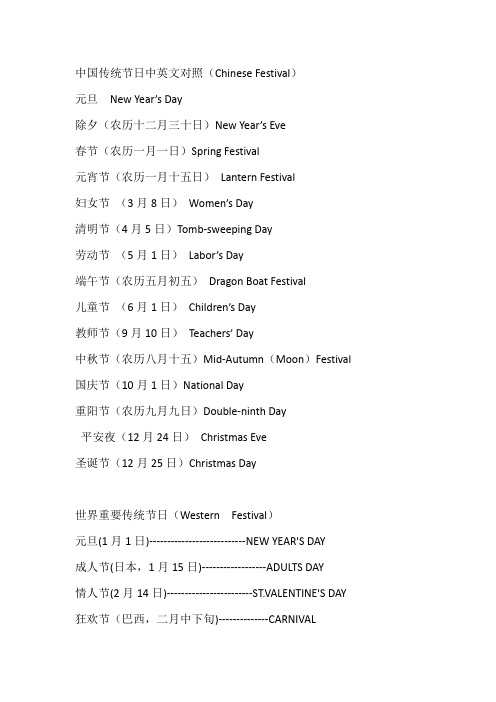
中国传统节日中英文对照(Chinese Festival)元旦New Year’s Day除夕(农历十二月三十日)New Year’s Eve春节(农历一月一日)Spring Festival元宵节(农历一月十五日)Lantern Festival妇女节(3月8日)Women’s Day清明节(4月5日)Tomb-sweeping Day劳动节(5月1日)Labor’s Day端午节(农历五月初五)Dragon Boat Festival儿童节(6月1日)Children’s Day教师节(9月10日)Teachers’ Day中秋节(农历八月十五)Mid-Autumn(Moon)Festival 国庆节(10月1日)National Day重阳节(农历九月九日)Double-ninth Day平安夜(12月24日)Christmas Eve圣诞节(12月25日)Christmas Day世界重要传统节日(Western Festival)元旦(1月1日)---------------------------NEW YEAR'S DAY成人节(日本,1月15日)------------------ADULTS DAY情人节(2月14日)------------------------ST.VALENTINE'S DAY 狂欢节(巴西,二月中下旬)--------------CARNIVAL国际妇女节(3月8日)---------------INTERNATIONAL WOMEN'S DAY 愚人节(4月1日)-------------------------FOOL'S DAY复活节(春分月圆后第一个星期日)---------EASTER国际劳动节(5月1日)-----------------INTERNATIONAL LABOUR DAY 母亲节(5月的第二个星期日)--------------MOTHER'S DAY国际儿童节(6月1日)-------------INTERNATIONAL CHILDREN''S DAY 父亲节(6月的第三个星期日)--------------FATHER'S DAY端午节(阴历5月5日)---------------------DRAGON BOAT FESTIVAL 中秋节(阴历8月15日)--------------------MOON FESTIVAL教师节(中国,9月10日)------------------TEACHER'S DAY敬老节(日本,9月15日)------------------OLD PEOPLE'S DAY南瓜节(北美10月31日)-------------------PUMPKIN DAY鬼节(万圣节除夕,10月31日夜)-----------HALLOWEEN万圣节(11月1日)------------------------HALLOWMAS感恩节(美国,11月最后一个星期4)--------THANKSGIVING圣诞除夕(12月24日)---------------------CHRISTMAS EVE圣诞节(12月25日)-----------------------CHRISTMAS DAD节礼日(12月26日)-----------------------BOXING DAY。
中国节日英语简介(英汉对照)
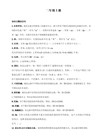
元旦New YearIt falls on the first day of the year. It marks the beginning of a year. People will plan what to do in the New Year. Because they believe that the whole year's work depends on a good start in spring.春节Spring FestivalSpring Festival is the most important festival in China. It is on the first day of the first lunar month(阴历正月). On the eve of the festival, people will paste spring poems(贴春联)with lucky words. They prepare delicious food, dumpling is a must. They also clean their house, but there is no sweeping on spring festival for people think it will sweep away good luck. People often come back home to enjoy family reunion, the whole family will get together for the big dinner. They also exchange greeting with other friends and relatives.元宵Lantern FestivalIt comes on the 15th of the first lunar month and it marks the end of the Spring Festival. On this day, people often eat sweet dumplings(元宵)for good luck. They will visit the display of lanterns(灯展)or go for temple fair(庙会)清明QingmingQingming —It is also called Tomb-Sweeping Day. It falls on April 4th or 5th. That is a special day for the living to show love and respect to their dead friends or relatives. People often go to sweep the tomb and put themeat, wine in front of the tomb. One interesting thing is that people burn the paper money for the dead.端午Dragon Boat FestivalThis day is on the fifth of the fifth lunar month, People often get together to watch the wonderful “Dragon Boat Race”(龙舟大赛),Rice dumpling is a must on Dragon Boat Festival.中秋Mid-autumn DayIt comes on the 15th of the eighth lunar month. People often gaze at the “Lady in the moon”(嫦娥) and eat moon cakes.腊月二十三——小年December 23 of the Lunar Calendar (Little New Year) Custom: Worshiping the Kitchen GodAs the legend goes, there is a kitchen god in each house who is responsible for the kitchen and oversees the conduct of the family. On this day, the kitchen god returns to Heaven to report the conducts of the family to the Emperor of Heaven. Therefore, worshipping the kitchen god aims to “please him.” People put out some sweet and sticky foods, such as rice dumplings and malted sugar. In this way, the lips of the kitchen god will stuck together, and he cannot report any wrong doings of the family. Thus the family can lead an auspicious life.习俗:祭灶民俗传说中,每家都有一位灶神掌管饮食,也记录一家人的言行。
中国传统节日介绍英文版

中国传统节日介绍英文版Chinese Traditional FestivalsChinese culture is rich and diverse, and one of its most distinctive features is its traditional festivals. These festivals, deeply rooted in Chinese history, reflect the customs, beliefs, and values of the Chinese people. In this article, we will introduce some of the most significant Chinese traditional festivals.1. Spring Festival (Chinese New Year)The Spring Festival, also known as Chinese New Year, is the most important and widely celebrated festival in China. It marks the beginning of the lunar calendar and usually falls in January or February. During this festival, families come together for feasts, exchange gifts, and set off fireworks. The highlight of the Spring Festival is the Dragon and Lion Dance, in which performers mimic the movements of these mythical creatures to bring good luck and ward off evil spirits.2. Lantern FestivalThe Lantern Festival marks the end of the Chinese New Year celebrations. It takes place on the fifteenth day of the lunar calendar, symbolizing the first full moon of the year. People hang decorative lanterns, solve riddles written on lanterns, and eat sweet rice dumplings called tangyuan. The skies are adorned with beautiful flying lanterns that create a magical atmosphere.3. Dragon Boat FestivalThe Dragon Boat Festival, also known as Duanwu Festival, is celebrated on the fifth day of the fifth lunar month. This festival commemorates the ancient poet Qu Yuan and commemorates his suicide by drowning himself in a river. Dragon boat races are held to reenact the search for Qu Yuan's body and to pay homage to him. People also eat sticky rice dumplings wrapped in bamboo leaves called zongzi during this festival.4. Mid-Autumn FestivalThe Mid-Autumn Festival, also known as the Moon Festival, is celebrated on the fifteenth day of the eighth lunar month. It is a time for families to gather and appreciate the full moon while eating mooncakes. Mooncakes are traditionally filled with sweet bean paste or lotus seed paste and often contain a salted egg yolk symbolizing the moon. The festival also includes lantern displays and the exchange of small gifts.5. Qingming Festival (Tomb-Sweeping Day)Qingming Festival, also known as Tomb-Sweeping Day, is a time to honor deceased ancestors. It usually occurs on April 4th or 5th of each year. During this festival, families visit the graves of their ancestors to clean and tidy the tombstones, make offerings, and burn incense. It is also a time for people to enjoy outdoor activities such as flying kites and hiking.6. Double Ninth FestivalThe Double Ninth Festival, also known as Chongyang Festival, is celebrated on the ninth day of the ninth lunar month. As the name suggests, this festival falls on a day with a double yang (阳) numerical order, which symbolizes strength and fortune. On this day, people often climb mountains,fly kites, and drink chrysanthemum wine to ward off evil spirits and pray for good health and longevity.7. Winter Solstice FestivalThe Winter Solstice Festival, also known as Dongzhi Festival, is celebrated on the shortest day and longest night of the year, around December 21st. It is a time for families to get together and enjoy a special meal. Tangyuan, a sweet glutinous rice ball, is a traditional food during this festival. Eating tangyuan symbolizes family reunion and the arrival of longer days as we move into winter.In conclusion, Chinese traditional festivals hold great significance in the hearts of the Chinese people, serving as a means to connect with their cultural roots, strengthen family ties, and express their hopes and wishes. The festivals mentioned above are just a glimpse into the rich tapestry of Chinese traditions, each with its unique traditions, customs, and beliefs. By celebrating these festivals, the Chinese people pass down their heritage from generation to generation, ensuring that their cultural identity remains alive and vibrant.。
中国节日介绍英文版
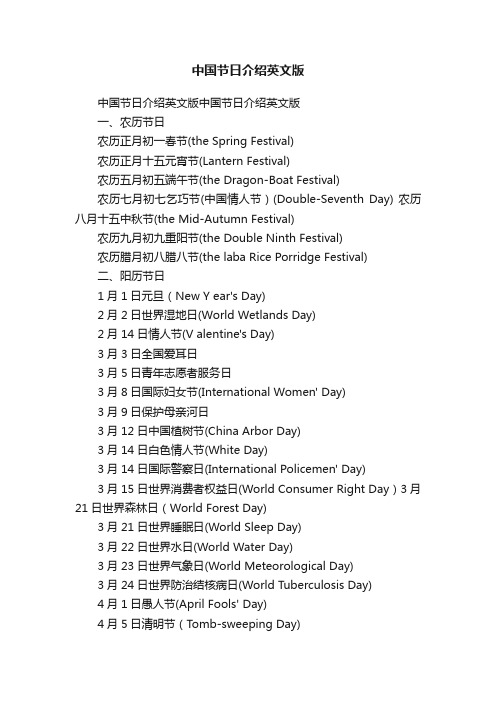
中国节日介绍英文版中国节日介绍英文版中国节日介绍英文版一、农历节日农历正月初一春节(the Spring Festival)农历正月十五元宵节(Lantern Festival)农历五月初五端午节(the Dragon-Boat Festival)农历七月初七乞巧节(中国情人节)(Double-Seventh Day) 农历八月十五中秋节(the Mid-Autumn Festival)农历九月初九重阳节(the Double Ninth Festival)农历腊月初八腊八节(the laba Rice Porridge Festival)二、阳历节日1月1日元旦(New Y ear's Day)2月2日世界湿地日(World Wetlands Day)2月14日情人节(V alentine's Day)3月3日全国爱耳日3月5日青年志愿者服务日3月8日国际妇女节(International Women' Day)3月9日保护母亲河日3月12日中国植树节(China Arbor Day)3月14日白色情人节(White Day)3月14日国际警察日(International Policemen' Day)3月15日世界消费者权益日(World Consumer Right Day)3月21日世界森林日(World Forest Day)3月21日世界睡眠日(World Sleep Day)3月22日世界水日(World Water Day)3月23日世界气象日(World Meteorological Day)3月24日世界防治结核病日(World Tuberculosis Day)4月1日愚人节(April Fools' Day)4月5日清明节(Tomb-sweeping Day)4月7日世界卫生日(World Health Day)4月22日世界地球日(World Earth Day)4月26日世界知识产权日(World Intellectual Property Day) 5月1日国际劳动节(International Labour Day)5月3日世界哮喘日(World Asthma Day)5月4日中国青年节(Chinese Y outh Day)5月8日世界红十字日(World Red-Cross Day)5月12日国际护士节(International Nurse Day)5月15日国际家庭日(International Family Day)5月17日世界电信日(World Telecommunications Day)5月20日全国学生营养日5月23日国际牛奶日(International Milk Day)5月31日世界无烟日(World No-Smoking Day)6月1日国际儿童节(International Children's Day)6月5日世界环境日(International Environment Day)6月6日全国爱眼日6月17日世界防治荒漠化和干旱日(World Day to combat desertification)6月23日国际奥林匹克日(International Olympic Day)6月25日全国土地日6月26日国际禁毒日(International Day Against Drug Abuse and Illicit Trafficking)7月1日中国共产党诞生日(Anniversary of the Founding of the Chinese Communist Party) 7月1日国际建筑日(International Architecture Day)7月7日中国人民抗日战争纪念日7月11日世界人口日(World Population Day)8月1日中国人民解放军建军节(Army Day)8月12日国际青年节(International Y outh Day)9月8日国际扫盲日(International Anti-illiteracy Day)9月10日中国教师节(Teacher's Day)9月16日中国脑健康日9月16日国际臭氧层保护日(International Day for the Preservation of the Ozone Layer)9月20日全国爱牙日9月21日世界停火日(World Cease-fire Day)9月27日世界旅游日(World Tourism Day)10月1日中华人民共和国国庆节(National Day)10月1日国际音乐日(International Music Day)10月1日国际老年人日(International Day of Older Persons)。
中国五大传统节日英语介绍

中国五大传统节日英语介绍The five traditional Chinese festivals are the Spring Festival, the Dragon Boat Festival, the Mid-Autumn Festival, the Qingming Festival, and the Double Ninth Festival.The Spring Festival, also known as Chinese New Year, is the most important festival in China. It is a time forfamily reunions, feasting, and giving and receiving red envelopes filled with money. People also set offfirecrackers and display traditional decorations such as paper cuttings and couplets. The festival lasts for 15 days and culminates in the Lantern Festival.The Dragon Boat Festival, also known as Duanwu Festival, is celebrated on the fifth day of the fifth month of the lunar calendar. It commemorates the poet Qu Yuan and includes dragon boat races, eating sticky rice dumplings, and hanging up aromatic herbs to ward off evil spirits.The Mid-Autumn Festival, also known as the Moon Festival, is a time for giving thanks and praying for a good harvest. Families gather to admire the full moon and eat mooncakes,a traditional pastry filled with sweet bean paste or lotusseed paste. Lanterns are also lit to symbolize reunion and harmony.The Qingming Festival, also known as Tomb-Sweeping Day,is a time for honoring ancestors and paying respects to the deceased. People clean and sweep their ancestors' graves, offer food and wine, and burn incense and paper money as a sign of respect. It is also a time for outdoor activities such as flying kites and having picnics.The Double Ninth Festival, also known as Chongyang Festival, is celebrated on the ninth day of the ninth month of the lunar calendar. It is a time for climbing mountains, appreciating chrysanthemums, and drinking chrysanthemum wine. The festival is also associated with the custom of wearing dogwood and eating double ninth cakes to ward off evil.这五大传统节日分别是春节、端午节、中秋节、清明节和重阳节。
中国传统文化之--传统节日((中英文)
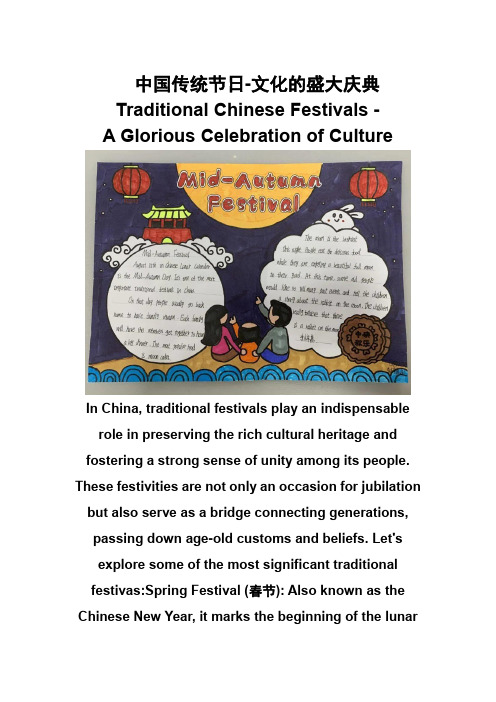
中国传统节日-文化的盛大庆典Traditional Chinese Festivals -A Glorious Celebration of CultureIn China, traditional festivals play an indispensablerole in preserving the rich cultural heritage and fostering a strong sense of unity among its people. These festivities are not only an occasion for jubilation but also serve as a bridge connecting generations, passing down age-old customs and beliefs. Let'sexplore some of the most significant traditionalfestivas:Spring Festival (春节): Also known as the Chinese New Year, it marks the beginning of the lunaryear and is celebrated with grandeur. Families reunite, and streets dazzle with vibrant red lanterns anddecorations symbolizing prosperity and luck. The highlight of the festival is the awe-inspiring dragon and lion dances that captivate spectators. Lantern Festival (元宵节): Falling on the 15th day of the lunar year, this joyful festival sees cities adorned with beautifully crafted lanterns. Riddles written on the lanterns add an element of intellectual fun to the celebrations. A must-try delicacy is "tangyuan," sweet rice dumplings, symbolizing unity and harmony within families.Qingming Festival (清明节): During this solemn occasion, Chinese people pay tribute to their ancestors by cleaning and tidying their gravesites. The serene atmosphere is also filled with the flying of kites, making it a day of both remembrance and rejoicingDragon Boat Festival (端午节): Commencing with the exhilarating dragon boat races, this festival commemorates the ancient poet Qu Yuan. People savor "zongzi," pyramid-shaped glutinous rice wrapped in bamboo leaves, while the fragrance of medicinal herbs fills the air to ward off diseases.Qixi Festival (七夕节): Often referred to as the Chinese Valentine's Day, Qixi celebrates the legendary love story of the Cowherd and the Weaver Girl. Star-crossed lovers unite on this romantic day, and the skies shimmer with colorful fireworks.Mid-Autumn Festival (中秋节): Under the radiance of the full moon, families gather to enjoy mooncakes and pomelos, symbolizing unity and good fortune. The festival is a time for expressing gratitude and reuniting with loved ones.Double Ninth Festival (重阳节): On this day, people ascend to high places to appreciate the beauty of autumn and pay respects to the elderly. Chrysanthemums, a symbol of longevity, are given as gifts, and hiking in nature is a popular activity.Winter Solstice Festival (冬至节): As the longest night of the year, it marks the return of longer daylight hours. Families indulge in warming foods like dumplings and tangyuan, signifying a prosperous and bountiful year ahead.Lunar New Year's Eve (除夕): On the last day of the lunar year, families come together for a lavish reunion dinner. The festivities reach their zenith with the joyous display of fireworks, symbolizing the expulsion of evil spirits.These festivals exemplify the deep-rooted cultural values and traditions of China, reflecting the nation's enduring commitment to preserving its heritage. Each event brings people closer, fostering harmony and appreciation for the customs that have withstood the test of time.中国传统节日-文化的盛大庆典在中国,传统节日对于保护丰富的文化遗产和培养人们的团结感起着不可或缺的作用。
- 1、下载文档前请自行甄别文档内容的完整性,平台不提供额外的编辑、内容补充、找答案等附加服务。
- 2、"仅部分预览"的文档,不可在线预览部分如存在完整性等问题,可反馈申请退款(可完整预览的文档不适用该条件!)。
- 3、如文档侵犯您的权益,请联系客服反馈,我们会尽快为您处理(人工客服工作时间:9:00-18:30)。
各种传统节日的中英文介绍
1. 春节(农历一月一日) Spring Festival;Chinese New Year's Day
2. 元宵节(农历一月十五日) Lantern Festival
3. 清明节(4月5日)Tomb-Sweeping Day
4. 端午节(农历五月初五) Dragon Boat Festival
5.中秋节(农历八月十五) Mid-Autumn (Moon)Festival
6. 重阳节(农历九月九日) Double-ninth Day
7.. 除夕(农历十二月三十日)New Year's Eve
【中国常见传统活动中英对照】
过年celebrate the spring festival
春联spring festival couplets
剪纸paper-cuts
年画new year paintings
买年货do shopping for the spring festival;do spring festival shopping
敬酒propose a toast
灯笼lantern
烟花fireworks
爆竹firecrackers (people scare off evil spirits and ghosts with the loud pop.)
红包red packets (cash wrapped up in red paper,symbolize fortune and wealth in the coming year.)
舞狮lion dance (the lion is believed to be able to dispel evil and bring good luck.)
舞龙dragon dance (to expect good weather and good harvests)
戏曲traditional opera
杂耍variety show
灯谜riddles written on lanterns
灯会exhibit of lanterns
守岁staying-up
拜年pay new year's call;give new year's greetings;pay new year's visit
禁忌taboo
去晦气get rid of the ill- fortune
祭祖宗offer sacrifices to one's ancestors
压岁钱gift money;money given to children as a lunar new year gift culture note;inthe old days,new year's money was given in the form of one hundred copper coins strung together on a red string and symbolized the hope that one would live to be a hundred years old. today, money is placed inside red envelopes in denominations considered auspicious and given to represent luck and wealth 辞旧岁bid farewell to the old year
扫房spring cleaning; generalhouse-cleaning
年糕nian-gao; rise cake; new year cake
团圆饭family reunion dinner
年夜饭the dinner on new year's eve 饺子jiao-zi/dumpling
粽子rice dumpling。
